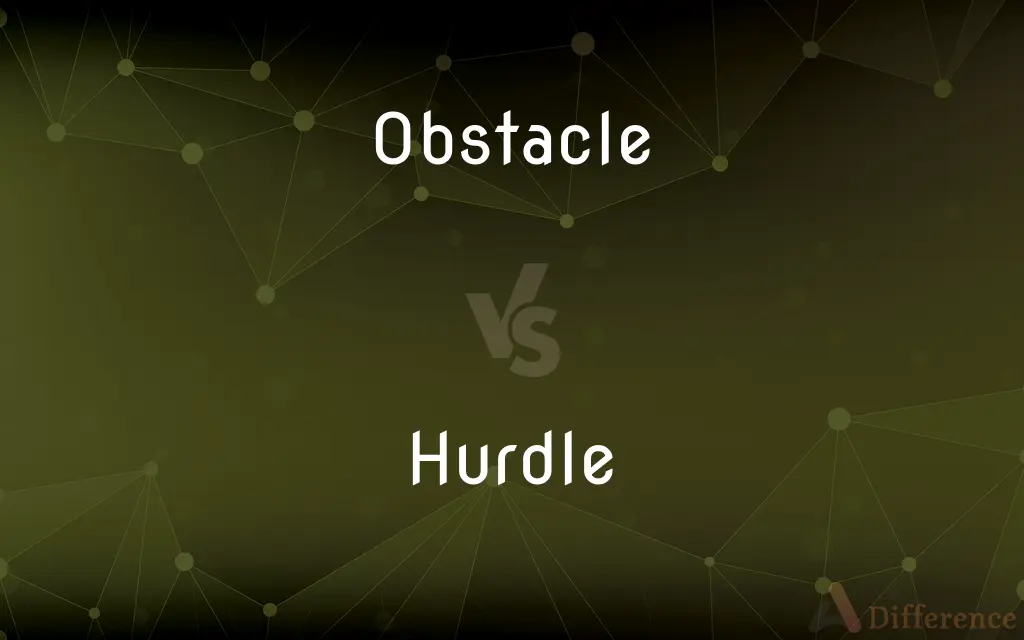Obstacle vs. Hurdle — What's the Difference?
By Tayyaba Rehman — Updated on October 5, 2023
Obstacle refers to a thing that blocks one's way or prevents progress, while a hurdle, though similar, often implies a difficulty to be overcome or dealt with in pursuit of a goal.

Difference Between Obstacle and Hurdle
Table of Contents
ADVERTISEMENT
Key Differences
An obstacle typically signifies any impediment or blockade that hinders progress or movement, generally presenting a physical or metaphorical barrier that stands in the way. Hurdle, while also indicating a barrier, often implies a challenge or difficulty that must be overcome, often within a context of a series of problems.
Obstacles may or may not be circumvented easily, possibly requiring a change of path or a strategic approach to navigate. In contrast, a hurdle usually implies an obstacle that can be surmounted or overcome, often through a direct effort or maneuver.
The application of "obstacle" is often broader, embodying both physical barriers and metaphorical impediments. "Hurdle," although it may be used similarly, often leans more towards an obstacle that can be conquered with effort, and may also be used in a competitive or sportive context.
Obstacles can denote a sense of staunch, impenetrable barriers that require alternative strategies to navigate. On the other hand, hurdles can insinuate a level of expectation for overcoming, as seen in track events where they are literally jumped over.
The usage of obstacle might imply a more significant or daunting challenge due to its potentially immovable or challenging nature. Hurdles, conversely, while indicating challenges, may carry a somewhat lighter connotation, emphasizing surmountability.
ADVERTISEMENT
Comparison Chart
Definition
Something that impedes or hinders progress.
An obstacle to be overcome or surmounted.
Connotation
May imply a significant barrier or impediment.
Often implies an obstacle that is surmountable.
Use in Context
Can be a physical blockade or metaphorical issue.
Might suggest a series of challenges to navigate.
Ease of Overcoming
Might suggest a need for circumvention or alteration.
Implies possibility of direct overcoming.
Associative Usage
Can be standalone barriers or challenges.
May imply a part of a series of difficulties.
Compare with Definitions
Obstacle
A physical blockade preventing passage.
The fallen tree was an obstacle in the road.
Hurdle
An obstacle to be overcome.
Passing the examination was the first hurdle.
Obstacle
A factor hindering progress.
Lack of funds is an obstacle to the project.
Hurdle
A problem providing resistance.
Financial instability is a significant hurdle for startups.
Obstacle
A situation causing a diversion.
The traffic jam created an obstacle for commuters.
Hurdle
A hurdle (UK English, limited US English) is a moveable section of light fence. In the United States, terms such as "panel", "pipe panel" or simply "fence section" are used to describe moveable sections of fencing intended for agricultural use and crowd control; "hurdle" refers primarily to fences used as jumping obstacles for steeplechasing with horses or human track and field competition.
Obstacle
A mental barrier inhibiting success.
Self-doubt often becomes an obstacle to success.
Hurdle
One of a series of upright frames over which athletes in a race must jump
A hurdle race
Obstacle
An opponent or adversary.
The final boss was a significant obstacle.
Hurdle
A problem or difficulty that must be overcome
Many would like to emigrate to the United States, but face formidable hurdles
Obstacle
An obstacle (also called a barrier, impediment, or stumbling block) is an object, thing, action or situation that causes an obstruction. Different types of obstacles include physical, economic, biopsychosocial, cultural, political, technological and military.
Hurdle
A portable rectangular frame strengthened with withies or wooden bars, used as a temporary fence.
Obstacle
A thing that blocks one's way or prevents or hinders progress
The major obstacle to achieving that goal is money
Hurdle
Take part in a hurdle race
This gelding hurdled fluently
She took up hurdling
Obstacle
Something that stands in the way of or holds up progress
The road crew removed the obstacle of the fallen tree limb. We had to overcome many obstacles to put on this show.
Hurdle
Enclose or fence off with hurdles
A maze of individual hurdled pens
Obstacle
Something that impedes, stands in the way of, or holds up progress, either physically or figuratively
A big obstacle to understanding the manual was that it had been poorly translated from the Japanese.
Hurdle
A light portable barrier over which competitors must leap in certain races.
Obstacle
That which stands in the way, or opposes; anything that hinders progress; a hindrance; an obstruction, physical or moral.
If all obstacles were cut away.And that my path were even to the crown.
Hurdle
Hurdles A race in which a series of such barriers must be jumped without the competitors' breaking their stride.
Obstacle
Something immaterial that stands in the way and must be circumvented or surmounted;
Lack of immagination is an obstacle to one's advancement
The poverty of a district is an obstacle to good education
The filibuster was a major obstruction to the success of their plan
Hurdle
A leaping step made off one foot as means of maximizing spring at the end of an approach, as to a dive.
Obstacle
An obstruction that stands in the way (and must be removed or surmounted or circumvented)
Hurdle
An obstacle or difficulty to be overcome
The last hurdle before graduation.
Hurdle
Chiefly British A portable framework made of intertwined branches or wattle and used for temporary fencing.
Hurdle
Chiefly British A frame or sledge on which condemned persons were dragged to execution.
Hurdle
To leap over (a barrier) in or as if in a race.
Hurdle
To overcome or deal with successfully; surmount
Hurdle a problem.
Hurdle
To leap over a barrier or other obstacle.
Hurdle
An artificial barrier, variously constructed, over which athletes or horses jump in a race.
He ran in the 100 metres hurdles.
Hurdle
(figuratively) An obstacle, real or perceived, physical or abstract.
Hurdle
A movable frame of wattled twigs, osiers, or withes and stakes, or sometimes of iron, used for enclosing land, for folding sheep and cattle, for gates, etc.; also, in fortification, used as revetments, and for other purposes.
Hurdle
A sled or crate on which criminals were formerly drawn to the place of execution.
Hurdle
To jump over something while running.
He hurdled the bench in his rush to get away.
Hurdle
To compete in the track and field events of hurdles (e.g. high hurdles).
Hurdle
To overcome an obstacle.
Hurdle
To hedge, cover, make, or enclose with hurdles.
Hurdle
(T-flapping) hurtle
Hurdle
A movable frame of wattled twigs, osiers, or withes and stakes, or sometimes of iron, used for inclosing land, for folding sheep and cattle, for gates, etc.; also, in fortification, used as revetments, and for other purposes.
Hurdle
In England, a sled or crate on which criminals were formerly drawn to the place of execution.
Hurdle
An artificial barrier, variously constructed, over which men or horses leap in a race.
Hurdle
To hedge, cover, make, or inclose with hurdles.
Hurdle
A light movable barrier that competitors must leap over in certain races
Hurdle
An obstacle that you are expected to overcome;
The last hurdle before graduation
Hurdle
The act of jumping over an obstacle
Hurdle
Jump a hurdle
Hurdle
A barrier to be jumped in a race.
The athlete effortlessly cleared the hurdle.
Hurdle
An upright frame athletes leap over.
He trained daily to jump over the hurdle.
Hurdle
A challenge within a sequence.
Losing a team member was an unexpected hurdle.
Common Curiosities
Can an obstacle be non-physical?
Yes, obstacles can be metaphorical, like emotional or societal issues.
Can a hurdle be a positive challenge?
Yes, hurdles can sometimes denote positive, growth-oriented challenges.
Can an obstacle be temporary?
Yes, obstacles can be transient or enduring.
Are obstacles always negative?
Typically yes, as they hinder progress, but they can lead to positive growth or change.
Can obstacles typically be overcome directly?
It depends; some obstacles might be circumvented, others confronted directly.
Can an obstacle inspire innovation?
Yes, obstacles often drive new strategies or solutions.
Do hurdles always suggest subsequent success?
Not always, but they often imply that overcoming is possible with effort.
Is every obstacle noticeable?
No, some obstacles, especially mental or societal, might not be immediately evident.
Does every hurdle require physical effort to overcome?
No, hurdles can be physical, mental, emotional, or societal, each requiring different strategies.
Is a hurdle always a physical barrier in sports?
Often, but "hurdle" can also metaphorically indicate a problem to overcome.
Can hurdles suggest a sequence of problems?
Yes, hurdles might imply a series of manageable challenges or steps.
Are all obstacles avoidable?
No, some obstacles might be inevitable or unanticipated.
Are hurdles and obstacles interchangeable?
While similar, hurdles often imply an expectation of being overcome, whereas obstacles might not.
Can a hurdle be enjoyable?
Potentially yes, especially in contexts like friendly competitions or personal challenges.
Can dealing with hurdles build resilience?
Often, yes. Navigating through hurdles can enhance problem-solving and adaptability skills.
Share Your Discovery

Previous Comparison
Potash vs. Potassium
Next Comparison
Appraiser vs. AppraiseeAuthor Spotlight
Written by
Tayyaba RehmanTayyaba Rehman is a distinguished writer, currently serving as a primary contributor to askdifference.com. As a researcher in semantics and etymology, Tayyaba's passion for the complexity of languages and their distinctions has found a perfect home on the platform. Tayyaba delves into the intricacies of language, distinguishing between commonly confused words and phrases, thereby providing clarity for readers worldwide.














































